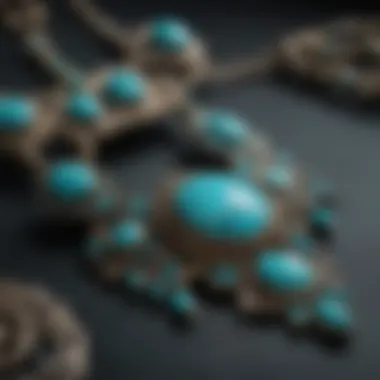Unveiling the Enigmatic Charm of Turquoise: Discovering the Mysteries Behind a Precious Gem


Rock and Fossil Identification
Turquoise, a gemstone revered for centuries, stands out for its captivating hues and cultural significance. Exploring the depths of this prized stone involves understanding its unique properties and symbolism, shedding light on its timeless charm. To identify turquoise in its raw form, one must distinguish it from other rocks and fossils. This entails noting its distinct color variations, ranging from sky blues to deep greens, coupled with characteristic veining patterns that set it apart from imitations. Utilizing tools such as magnifiers and ultraviolet lights can aid in pinpointing genuine turquoise, highlighting its authenticity.
Discovery and Exploration
Embarking on a journey to uncover the mysteries of turquoise unveils a tapestry of historical narratives and geological insights. Delving into its origins leads to fascinating tales of ancient civilizations valuing turquoise for its protective qualities and ornamental uses. By exploring prime collecting sites across diverse landscapes, enthusiasts can appreciate the geological formations that harbor this precious gemstone. Noteworthy discoveries in the field provide a glimpse into the significance of turquoise within different cultural contexts, enriching one's appreciation for its enduring allure.
Cultural Significance and Symbolism
Turquoise's significance transcends its physical beauty, intertwining with cultural symbolism across civilizations. From ancient Egypt to Native American tribes, turquoise holds diverse meanings as a symbol of protection, healing, and wisdom. Understanding the symbolic associations attached to turquoise enhances its allure, offering a deeper connection to its spiritual and metaphysical properties. By delving into the rituals and beliefs surrounding turquoise in various cultures, one gains insight into the profound impact this gemstone has had on human history and identity.
Preservation and Appreciation
Preserving turquoise specimens involves meticulous techniques to maintain their luster and integrity over time. Proper storage methods, such as storing in acid-free tissue paper or felt-lined boxes, safeguard against discoloration and damage. Creative display ideas, including showcasing turquoise in shadow boxes or jewelry settings, elevate its aesthetic appeal for enthusiasts and collectors. By appreciating the art of preserving and displaying turquoise, individuals can share its beauty with future generations, ensuring its timeless charm endures.


Introduction
Turquoise, a gemstone of immense cultural value and aesthetic appeal, holds a fascinating history entwined with various civilizations. This article embarks on a journey to unravel the mysteries surrounding turquoise, shedding light on its symbolism, geological origins, physical attributes, and metaphysical properties.
Origin of the Name
Etymology
The term 'turquoise' originates from the French expression 'pierre tourques,' referencing stones from Turkey. This gem's name echoes the longstanding historical connection between turquoise and Turkish trade routes, emphasizing its significance as a prized commodity. The etymology of 'turquoise' reflects the gem's prestigious heritage and global trade influence.
Historical References
Throughout history, turquoise has been revered by civilizations worldwide for its captivating hues and cultural significance. Ancient archaeological findings and texts depict turquoise as a symbol of protection and prosperity, underscoring its enduring prominence. The incorporation of turquoise in adornments and artwork has transcended time, solidifying its reputation as a gemstone of historical reverence.
Cultural Significance
In diverse cultures, turquoise symbolizes purity, wisdom, and spiritual balance. From Native American rituals to Tibetan traditions, this gem holds symbolic importance in ceremonies and daily life practices. Its cultural resonance extends to modern interpretations, where turquoise continues to be cherished for its deep-rooted cultural symbolism and protective properties.


Geological Formation
Formation Process
Turquoise forms through the gradual precipitation of copper-containing minerals in host rocks, creating intricate veins and nodules. This geological process accentuates the unique patterns and color variations found in turquoise gemstones, making each piece distinctive in its formation and allure.
Deposits and Mining
Turquoise deposits are primarily found in arid regions with specific geological conditions conducive to its formation. Mining operations unearth turquoise from host rocks, requiring meticulous extraction to preserve the gem's integrity. The mining of turquoise balances the demand for this precious stone with sustainable practices to safeguard natural resources.
Notable Sources
Notable turquoise sources include regions like Iran, the United States, and Mexico, known for producing high-quality gemstones coveted in the jewelry industry. These diverse sources contribute to the global supply of turquoise, offering a spectrum of colors and textures that cater to varying aesthetic preferences.
Physical Characteristics
Color Variations


Turquoise exhibits a range of colors, from serene blues to vibrant green hues, influenced by the presence of copper and iron compounds. This color diversity enhances the gem's visual appeal and versatility in artistic creations, captivating enthusiasts with its dynamic and alluring shades.
Transparency Levels
The transparency of turquoise varies, with some stones possessing a translucent quality that allows light to penetrate, illuminating their vibrant colors. This optical property adds depth and radiance to turquoise gemstones, accentuating their beauty and creating captivating visual effects.
Texture and Luster
The texture of turquoise can range from smooth and polished to rugged and matte, showcasing the gem's natural variations and unique character. Its luster, characterized by a soft sheen or gentle glow, contributes to its aesthetic charm, reflecting light in a way that accentuates its surface qualities.
Metaphysical Properties
Spiritual Connections
Turquoise is known for fostering spiritual connections, promoting inner tranquility and harmony. Its association with the throat chakra signifies clear communication and expression, making it a symbol of spiritual growth and self-awareness. The spiritual essence of turquoise resonates with individuals seeking balance and alignment.
Healing Energies
Believed to possess healing energies, turquoise is thought to alleviate physical ailments and emotional imbalances. Its calming presence soothes the mind and spirit, promoting holistic well-being and rejuvenation. The therapeutic properties of turquoise make it a sought-after gem for healing practices and energy restoration.
Emotional Benefits
Turquoise is renowned for its emotional benefits, imparting a sense of peace and positivity to those who wear or interact with it. This gemstone is valued for its ability to dispel negative energies, instilling a sense of serenity and optimism. The emotional upliftment provided by turquoise enhances emotional resilience and mental clarity.







